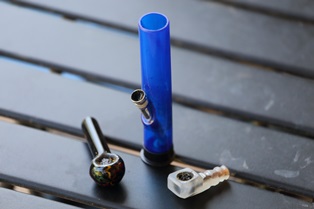Virginia’s drug laws go beyond prohibiting the possession, use, or sale of illegal drugs. They also make it illegal to possess or sell certain types of drug paraphernalia or controlled paraphernalia. 
What Drug Paraphernalia Is Illegal?
The Code of Virginia § 54.1-3466 defines controlled paraphernalia as:
- “a hypodermic syringe, needle, or other instrument or implement or combination thereof adapted for the administration of controlled dangerous substances by hypodermic injections under circumstances that reasonably indicate an intention to use such controlled paraphernalia for purposes of illegally administering any controlled drug or
- gelatin capsules, glassine envelopes, or any other container suitable for the packaging of individual quantities of controlled drugs in sufficient quantity to and under circumstances that reasonably indicate an intention to use any such item for the illegal manufacture, distribution, or dispensing of any such controlled drug.”
Specifically, the law does not make possession of hypodermic needs or gelatin capsules illegal. Instead, it is illegal to possess the paraphernalia if there is also intent to use it to administer, manufacture, distribute, or dispense illegal drugs.
Virginia law describes the evidence needed to prove that these types of items are being used as drug paraphernalia. The state needs to show evidence that the paraphernalia is in close proximity to equipment used in the illegal manufacture or distribution of controlled drugs. This could include, for example, common equipment such as scales, strainers, measuring spoons, and staplers.
Selling Drug Paraphernalia in Virginia
Virginia Code 18.2-265.3 makes it a crime to sell or intend to sell drug paraphernalia if you know or should reasonably know that the intended use of what you are selling is to, “illegally plant, propagate, cultivate, grow, harvest, manufacture, compound, convert, produce, process, prepare, test, analyze, pack, repack, store, contain, conceal, inject, ingest, inhale, or otherwise introduce into the human body marijuana or a controlled substance.”
Violating Virginia Drug Paraphernalia Law
It is a Class 1 misdemeanor to have possession of controlled paraphernalia or to sell, or intend to sell, drug paraphernalia. The potential criminal consequences of a Class 1 misdemeanor include a possible prison term of not more than 12 months and a potential fine of not more than $2,500.
If you are an adult and sell or intend to sell drug paraphernalia to a minor, you may be charged with a Class 6 felony. The possible criminal consequences of a Class 6 felony include a prison term of not less than one year and not more than five years. However, the jury, or the court if there is no jury, has the discretion to impose a possible prison sentence of not more than 12 months and a potential fine of not more than $2,500.
Additionally, a criminal conviction could have an impact on your ability to get a job, your personal relationships, and other aspects of your life that are not specifically included in the felony and misdemeanor statutes.
Contact a Virginia Criminal Defense Lawyer
You may have been charged with a drug paraphernalia crime, but that does not mean that you will be convicted. An experienced Virginia criminal defense lawyer can look at every aspect of your case to determine if the police conducted a lawful search, if there is evidence that the paraphernalia was connected to the manufacturing, possession, use, distribution, or selling of illegal drugs, or if there are other defenses that may be applicable to your case.
The lawyers of Kearney, Freeman, Fogarty & Joshi, PLLC will fight hard to ensure that you are treated fairly. Call us, or reach out to us via this website to learn more about your rights and about how we might be able to work together to protect your rights if you have been charged with a drug paraphernalia crime in Virginia.
|
Related links: |

